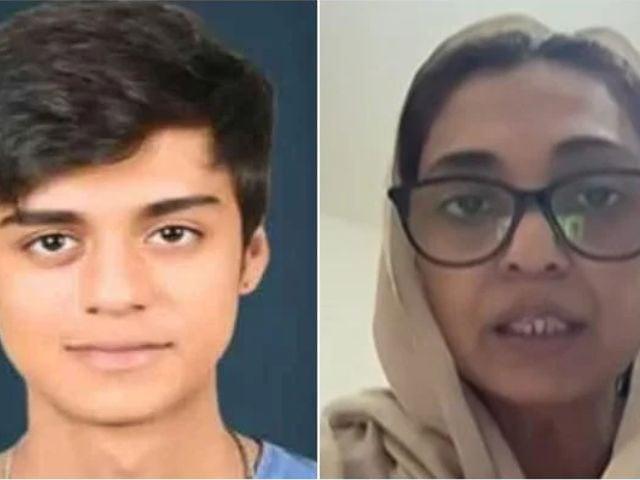The mother of the slain youth Mustafa Amir has certainly rejected any offer of DIYAT (blood money) and requires justice for her son’s brutal murder.
Wajiha Amir said while talking to the local news channel that she wanted the case to reach her legal conclusion and would not accept a financial solution under any circumstances.
Her remarks came after she was allegedly contacted by the family by the biggest suspect, Armaghan, during a recent hearing. She said Armaghan’s mother tried to negotiate and argued that her son had no financial motive when he was already wealthy.
Mustafa Amir was kidnapped and allegedly murdered by her friends on January 6 in Karachi’s Defense Housing Authority (DHA). Police say his body was filled in the trunk of his car and later burned in the Hub area of Balochistan.
When he talked about the events that led to her son’s death, Wajiha Amir revealed that Armaghan had lied about Mustafa’s residence when she desperately called for answers.
She also claimed that Armaghan and Mustafa had a long -standing rivalry, worsened by jealousy and negative influence from the suspected social circle.
As the investigation continues, Wajiha Amir, along with a social welfare organization, led a protest against Karachi’s Teen -Talwar and demanded justice.
Protesters held posters and banners and called for justice for Mustafa. The demonstration also included a Candlelight Vigil in Mustafa’s memory, where his mother actively participated.
In addition, a judge who handled the Mustafa Amir murder case was deprived of administrative powers after a Supreme Court panel found irregularities in his decision to refuse the police in custody.
The order follows allegations of manipulation and judicial overreaction that raise concerns about the integrity of the procedure.
A two-member Sindh High Court bench, led by Justice Zafar Rajput, sent a detailed verdict in which he ordered Judge Zakir Hussain, ordering Judge Zakir Hussain to be removed from his administrative role.
The court found significant procedural violations, including incorrect handling of custody requests and unauthorized changes in official documents.
According to the order, the judge exceeded his authority by denying police custody of the defendants, Armaghan, despite investigators who provided evidence.
The decision was especially controversial when the judge initially approved the police’s custody prison, but later changed the order to legal detention by using correction fluid.
The Supreme Court’s decision highlighted serious lapse in case management, saying that Judge Hussain held the investigative officer and waited for three hours before verbally instructing him to conduct a medical examination of the defendant.
This delay, noticed the court, hindered the investigative process.
The verdict also pointed out that the judge placed an order for a joint investigative team (JIT) in the case – a decision that neither the prosecution nor the defense had requested.
The prosecution and police officers later challenged this directive and argued that it was issued without proper legal reasons.
A medical examination of Armaghan found injury tags on his lower body, forehead, ear and neck.
However, the legal medical officer report did not confirm whether these injuries were due to police torture.
The judge had quoted accusations of police brutality as a reason for refusing custody, but High Court found insufficient evidence to justify his decision.
Sindh High Court instructed Chief Justice and Home Secretary to award the judge’s administrative powers to another anti-terrorism court in public interest.
The verdict emphasized that the judges in the trial are responsible for High Court and must follow proper legal procedures when making decisions on custody and investigative orders.
The order also ordered copies of the decision to be sent to the functioning Chief Justice in Sindh and the provincial home secretary, ensuring that the case is formally reviewed at a higher legal level.



